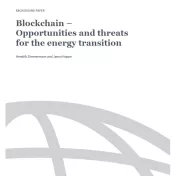
The project SYMPHONY – where Germanwatch was a partner in - aimed at providing a set of innovative ICT tools, integrated in a platform designed to tackle two pressing issues:
- preventing and mitigating economic and financial crises;
- fostering an economically and ecologically sustainable growth path.
The main objective of the project was to develop a framework for designing and testing policies and regulatory measures.
This deliverable documents a concise conceptual architecture that addresses user requirements.
Our solution specifies and defines how to orchestrate agent based macroeconomic models and simulators as well as stakeholder expectations in a gamified and engaging manner under a novel framework.
Over the last few years, the greatest concern of the global political agenda has been to find a way to overcome the financial and economic crisis and therefore to look for effective policy instruments and even for new theoretical economic frameworks. On the top of the urgency to find a way out of the crisis, and to prevent future crises by making the global economy more resilient, we needed new tools to explore the possibility of broad societal transitions to sustainable patterns of production and consumption. In particular, it is crucial to explore financial sector regulations and macroeconomic policies that help to trigger these sustainability transitions. Therefore the project was developed in strict cooperation with stakeholders and policy-makers, involved in the project to devise appropriate scenarios and modelling requirements.
The strategy to successfully accomplish the mission was to orchestrate a set of tools that will be able to:
- collect and analyze relevant information by means of social media mining tools and web-based information markets;
- simulate the complex economic dynamics by means of an agent based model of the global economy, explicitly designed for policy making;
- involve citizens in the decision making process through a serious game interface, and through a set of information markets on the artificial economy that will allow us to overcome the huge economic impasse of properly modeling expectations.
We identified user groups and integrated their views in the design of our concepts. With their help we managed to describe in detail the two challenges, financial stability and sustainability transition. Based on this information as well as our updated knowledge on the state of the art both from a research and practice perspective in the main areas of interest, we formulated the project’s vision and related conceptual architecture.


